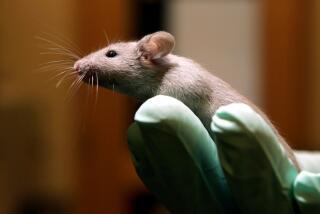New Way to Grow Human Brain Cells for Transplants Is Reported
- Share via
WASHINGTON — Scientists said Friday that they had developed a new way to grow human brain cells for use in transplants and that cells grown the same way had fixed brain defects in mice.
They hope their new technology can lead to better ways to treat a range of brain damage, from Parkinson’s disease to paralysis caused by stroke.
Evan Snyder of Harvard Medical School in Boston, along with colleagues, got human fetal brain cells to grow in a laboratory dish and transplanted them into the brains of newborn mice, where they grew and seemed to work. The mice appeared normal.
There are two achievements here: the development of the perpetual line of human brain cells, and getting them to spread around, grow and operate correctly in the brains of mice.
Snyder reported his findings in the journal Nature Biotechnology.
Researchers have made headlines by injecting brain cells from aborted fetuses into the brains of Parkinson’s patients, and finding these cells seem to help the patients.
But the use of fetal tissue is controversial, and getting a good supply of clean cells at the right time is hard.
Snyder’s team used brain cells from a single aborted or miscarried fetus and got them to grow in the laboratory. The cells grow and die perpetually.
“We got this tissue and we’ve never had to go back to a fetus again,” Snyder said. “It’s a pure culture, abundant, and the cells can be manipulated.”
Tests in humans are a long way off, he said, but human brain cells that were mingled with cells from mice with a genetic mutation produced enzymes that corrected the defects in the mouse brain cells.






